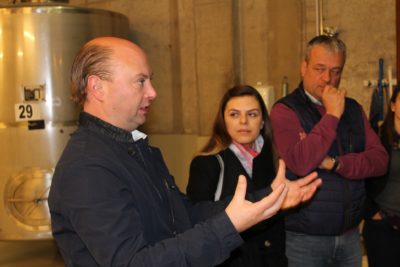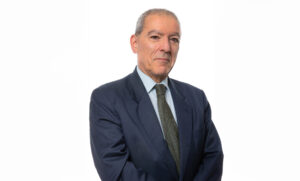Often referred to as the ‘Wine of Kings, King of Wines’, Royal Tokaji is becoming increasingly popular across the UK restaurant scene. As a supporter of the Gold Service Scholarship, the Hungarian winemaker recently hosted to a study trip for 2018 finalists and Trustees. We spoke with Charlie Mount, managing director of Royal Tokaji, to hear his thoughts on how the service sector is developing.
Tell us a little bit about your background.
My father was a wine merchant so I was lucky enough to discover great wine at an early age. After a law degree, I decided to see if I might buy wine with a staff discount for the rest of my life. I worked for a couple of UK retailers and a wholesaler before moving to Moët Hennessy for a long stint working with amazing brands, Michelin-starred restaurants, five-star hotels, as well as international collectors. I was also lucky enough to become brand manager for Krug.
I met the owner of Royal Tokaji in 2009 and in 2011 was offered the chance to lead the next stage in its development.
What is the background to Tokaji? Can you tell us a little bit about its history?
Vines have been known to grow in Tokaj since Roman times but probably before. Our own cellars were first carved out during the 13th Century. The famed Tokaji Aszú is first mentioned in 1571 and it is arguable that these were the first sweet wines ever produced using grapes affected by Botrytis or Noble Rot. Certainly, and as a sign of the wine’s importance, Tokaj was the first wine region to have an official vineyard classification (by 1730).
Tokaji wine received accolades from numerous great writers and composers including Beethoven, Liszt, Schubert, Johann Strauss, Goethe, Heinrich Heine, Friedrich von Schiller, Voltaire and Bram Stoker. The composer Joseph Haydn’s favourite wine was Tokaji. A reputation – supported by various Popes – for health giving properties, as well as lore – explored in some depth by the alchemist Paracelsus – that the wines contained gold also helped the legend grow.
How did Royal Tokaji itself develop?
Royal Tokaji was one of the first private companies founded after the fall of communism in Hungary. Under communist rule all wine production was controlled by the state and quality was sacrificed so that as much wine as possible could be made.
Hugh Johnson, the noted wine writer, was familiar with Tokaji as one of the world’s original fine wines and at the first opportunity put together a group of investors to found Royal Tokaji. The company’s goal was to work with the same raw materials that had first created these legendary wines and to return the wines of Tokaji to the pinnacle of the wine world.
What makes Royal Tokaji wine special?
We strive to honour the history of the region and its terroir by making the best wines possible. Although we are inspired by our rich past we are not a historical re-enactment society. Where appropriate we will use the most modern technology possible to turn the precious Aszú berries that have been individually picked – at the rate of around 7 kg per person, per day – into wines that can stand comparison with any in the world.
The secret of our Tokaji Aszú lies in the wonderful acidity, which balances our extraordinary levels of sweetness. This combined with the incredible minerality of our volcanic soils makes our wines some of the easiest to spot in a blind tasting.
How would you like people to understand Royal Tokaji wines?
Any fine wine should speak for itself and should delight without any need for understanding of things like soil types, grape varieties and wine-making. Having said that, any deeper knowledge can enhance this enjoyment even further. Understanding the wonderful volcanic soils of the region and the unique wine-making process helps to explain why our wines are so unique.
Understanding the difficulty of producing our Aszú wines and the incredibly small amount of wine we can make even in a great vintage helps to explain the prices, even though they are far below their early 20th Century peak.
Where are your wines served?
At the beginning of the 20th century, Tokaji Aszú wines were the most expensive in the world, served in the finest restaurants internationally and enjoyed by the Royal Courts of Europe.
We are slowly regaining this position. A third of Michelin-starred restaurants in the US serve our wine, with several pouring our Essencia for their guests by the crystal spoon. The position is similar in other markets. We are also honoured to bottle an exclusive wine, under their own label, for Buckingham Palace. More recently our wines have, we hope, become a crucial, if small, part of any serious collector’s cellar.
What role does service play in the restaurant experience?
Service is a key part of the process. Perfect service is so non-intrusive. The skill of doing that takes a huge amount of training and experience. The places that excel are those that are able to retain staff. A good business trains and looks after its staff so the staff stay.
It’s important to note that we have benefited from the influence of foreign nationals in the UK because they typically place a greater premium on service. You see so many coming from Italy, Switzerland and France. But we now see service as such an important part of the restaurant process in the UK too.
How has serviced changed through the course of your career?
There have always been pockets of great service in the industry but the competitive nature of the business has led to more and more establishments focusing on it. The biggest change I’ve noticed is that there is an increasing focus on welcoming guests from the outset. It’s far less intimidating. I recall going to a restaurant some years ago that felt like I was entering a cathedral. Things have changed and we have seen less formality.
On the wine side of service, we have seen that the terrifying sommelier no longer exists. There is an understanding that the customer needs more warmth, and a relaxation of formality. The UK industry as a whole has increased its attention to this, which is always seen at the front end by customer.
Service is always based on customer expectations. That’s why it will be very different in China, the US, and anywhere else. Most establishments find international levels of service but there will be local variants. Talented service staff will be able to adapt and this will always be the case throughout time.
Why do you support the scholarship?
We are a small company and it is important for us to have service staff who are aware of our wines. Being a small business, we like to do things a little differently compared to the bigger wine brands, so it is crucial to us for service staff to have awareness and be personable. That’s why we give them the opportunity to come out to Tokaji and find out more about our company and our wines.
The Gold Service Scholarship is the best of the best. It is committed to the industry so it’s very important to us.
Why do you think the GSS is important for the industry?
Great service does not happen by accident. Anything that can recognise its importance is fantastic. These people work hard and recognising talent and giving them that reward is very important. It’s wonderful to give them the opportunity to spend time with people like Silvano Giraldin – that has huge value for them. I also saw the Trustees getting real value from being with future talent. It’s a virtuous circle.
It was really good fun. Being able to spend time with capable, passionate people gives us real energy and faith in the future. It was wonderful to see the interest of so many people.
Senior staff have to understand all elements of the hospitality business. We sometimes learn more from people who aren’t wine professionals. There were many gems we took away from the day. These people are closer to our customers sometimes so it’s great to have a deeper understanding of what people are experiencing. You can never have too much information.



